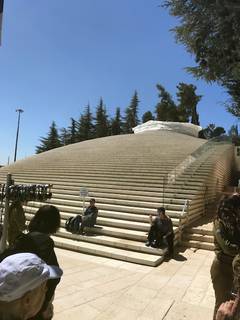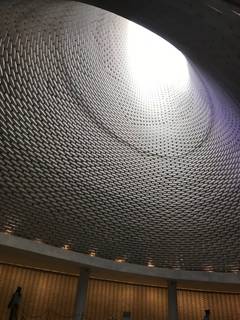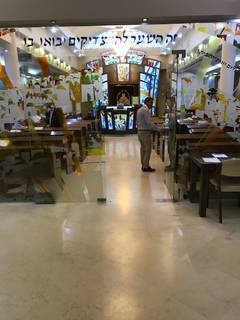05/30/2019 08:57:38 AM
Installment #3
I have not mentioned that although our MADRICHOT speak excellent English, the soldier who gives us our daily instructions does not. Since I have the distinction of being the most Hebrew proficient among these 12 volunteers, I acted as Translator. Between what I understand (I don't know any of the Hebrew names for tools, probably 'cause I don't use them much in ANY language!) and some pantomime, we had no major snafus.
On Thursday morning, April 11, we went to Jerusalem to visit the new (opened on the 50th anniversary of the reunification of Jerusalem - 2017) Government Memorial Hall to Casualties of Israel's Wars, on Mt. Herzl, adjoining the military cemetery. It is so new that they have not yet put together a brochure in English, only Hebrew.
It is all underground. The above-ground architecture, the bell-shaped roof of the hall, is quite remarkable. Civilian as well as military casualties are memorialized. At the entrance stands and eternal flame. The mezuzah at the entrance was once at one of the gates of the Old City of Jerusalem when the city was reunified.
Sundays through Thursdays at 11 AM, there is a brief memorial service, and the names are read of those casualties whose yahrzeit (death anniversary) occurs on that day. Thursdays, the list includes those whose yahrzeit is that Friday and Shabbat. In addition, photographs, parents' names, and date & age at death of as many of them as possible are electronically displayed. This morning, several family members of at least one of the departed were present and in fact, though the Yizkor prayer was recited by a military Rabbi, & the Eil Malei Rachamim was sung by a military Hazzan, the Kaddish prayer was recited by a family member. The Memorial Service concluded with the singing of Hatikvah.
Quotations from Jeremiah are inscribed throughout the hall, but the quotation at the exit is from the conclusion of a magnificent poem by the late Israeli poet Natan Alterman. The poem is called THE SILVER CHARGER, and basically makes the point that this wonderful state of Israel we now have, was given to us “on a silver charger” by the whole generation of young men and women who died in its defense. The last line is, "And the rest will be told by Israel's future generations." A perfect thought as one is leaving this place.
The bus took us back to the train station in Tel Aviv, where, before heading out to my relatives, I met with Danny Cohen, 32, son of Tami & Andy of Charlotte. Danny made Aliyah several years ago. He is a conscientious objector, so he did an alternative form of National Service, rather than the Israeli army. He is now a teacher. His study of Eastern religious disciplines has taught him how to channel such powerful emotions as anger. I guess that is helpful in Israel, where some Israelis have a reputation, sometimes earned, of being impatient and even aggressive.
On the following Friday evening, I decided to pray at the MIZRACHI (non-AshkenaIc & non-Sephardic) synagogue near the house of my Israeli cousins. I arrived a few minutes before Shabbat services began, and took a photo. The sanctuary is really lovely, with fancy crystal chandeliers. I was welcomed by one of the congregants who spoke no English, but gave me a prayer book, and showed me exactly where they were. Perhaps because they don't get many strangers, he asked me if everything was all right, if I needed any help of any sort. I thanked him profusely for asking, and said that I was just fine.
The Mincha (afternoon) service was led by a congregant, who remained at his seat. For this, as well as the Kabbalat Shabbat (Welcoming the Sabbath) & Ma'ariv (Evening) Services to come, every word was recited; not one word was skipped. Furthermore, there was no professional Cantor leading any service: every word of every prayer was recited in unison by the whole congregation in a special, sing-songy kind of Nusach, which I eventually was able not only to FOLLOW (which in itself is an achievement, because they zip through everything lightening-fast!), but sing along! Almost none of the melodies were familiar to me, but the music was very repetitive, which made participation easier.... As long as you could keep up!



We continued with Kabbalat Shabbat. Ironically, for the most famous prayer of Kabbalat Shabbat, the Lecha Dodi, they lustily sang a familiar Ashkenazic, Hasidic melody. Between that and the evening service, the man whom I presumed to be the congregation president, gave the announcements.
There was then a ritual that I did not quite understand at the time: the president seemed to be auctioning something off. I asked later, and was told that they auction off certain honors for the intermediate days of Passover, to help the synagogue make money. It's a custom that was very common in the synagogues of the lower Eastside, but is rarely encountered nowadays…among Ashkenazim!
A lovely experience altogether, followed by a lovely walk home & a tasty meal with my cousins.




